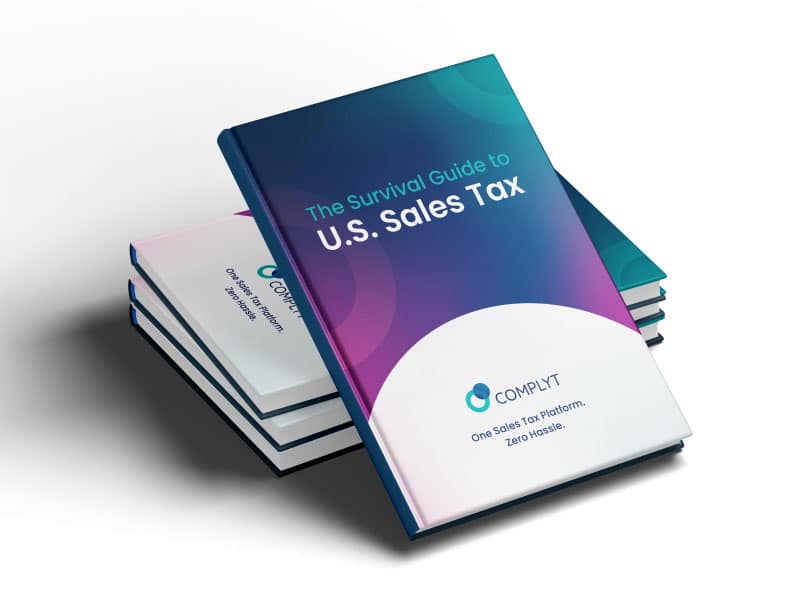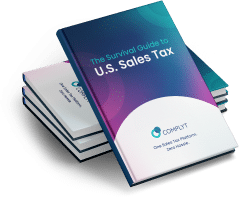What is the sales tax rate in New Jersey?
The state of New Jersey imposes a single, statewide sales tax rate of 6.625%. This rate applies across the state, with no additional city or county taxes on top of it. New Jersey is one of the only states that do not allow local jurisdictions to impose additional sales tax.
This makes the sales tax in New Jersey a lot simpler than in some other states where local rates can vary significantly. But that doesn’t mean that sales tax compliance is always a walk in the park all of a sudden.
Sales Tax New Jersey: When should your business collect Sales Tax?
If your business has a nexus in New Jersey, you’re required to collect and remit sales tax. It’s as simple as that. But that doesn’t help you a lot if the term “nexus” still sounds like Sci-fi lingo to you, now does it?
Nexus essentially means a connection or presence, which can come down to a physical presence or economic presence within the state. So whether it’s a physical location, employees, inventory, or even a significant amount of sales in the state, you could already have a New Jersey sales nexus without even realizing it.
New Jersey Physical Sales Tax Nexus
A physical nexus occurs when your business has a significant physical presence in a state. This could include a store, office, warehouse, or even a remote employee located in the state.
Sales Tax Physical Nexus Checklist for New Jersey
Here are common indicators that your business might have a physical nexus in New Jersey:
- Operating a physical store or office
- Storing inventory in the state
- Having employees that work in the state
- Attending trade shows or marketing events
If any of these apply, your business likely has a physical nexus and is required to charge sales tax in New Jersey.
New Jersey Economic Nexus: Revenue, Thresholds, and Transactions
Following the Supreme Court ruling in South Dakota v. Wayfair, New Jersey introduced the concept of economic nexus into their legislation in 2018.
New Jersey’s economic nexus laws oblige out-of-state sellers to collect and remit sales tax to the Department of the Treasury if they exceed $100,000 in sales or 200 transactions in New Jersey over the previous or current calendar year.
Which services are taxable in New Jersey?
New Jersey taxes many services, including some you might not expect. For example, cleaning services, repairs and maintenance services, and telecommunications services are all taxable in the Garden State.
Here is a list of some taxable services in New Jersey:
- Cleaning services
- Repair and maintenance services
- Telecommunications services
- Information services
- Personal services (including tanning salons and tattoo parlors)
Remember, this list is not exhaustive and taxability can change, which makes it imperative that businesses stay up to date with the latest changes to tax laws as prescribed by the New Jersey Division of Taxation. It’s also important to establish whether you have any exemption opportunities within New Jersey that could benefit your customers and improve your brand growth.
New Jersey Sales Tax on Products: How to Calculate What Your Business Should be Charging
Calculating sales tax in New Jersey is relatively simple due to the flat rate of 6.625% applied statewide. When a taxable sale occurs, you should apply this rate to the sales amount. For example, if you sell a product for $100, the sales tax would be $6.63 (rounded to the nearest penny), making the total charge $106.63.
Is clothing subject to sales tax in New Jersey?
No, the sale of clothing items for human use is generally exempt from sales tax in New Jersey according to the New Jersey Sales and Use Tax Act. However, there are some exceptions to this New Jersey clothing tax exemption, which makes items such as accessories, fur clothing, and sports equipment taxable.
New Jersey Online Sales Tax: Are SaaS and Digital Services Taxable?
New Jersey has specific rules for online sales, including Software as a Service (SaaS) and digital services, making New Jersey online sales tax a vital part of compliance.
While SaaS and digital goods are not taxed across the board in New Jersey, there are a few exceptions that digital service/product providers need to be aware of.
- Software services that provide access to any type of information, such as stock quotes, financial, legal research, property values, and marketing trends are taxable in New Jersey
- Some digital goods are also taxable in New Jersey, such as digital audio-visual works, digital audio works, and digital books
As such, it’s vital that businesses understand when their offerings are deemed taxable in New Jersey.
SaaS Sales Tax New Jersey: Does my Business Need to Charge Sales Tax for SaaS in New Jersey?
SaaS is generally not taxed in New Jersey, as it is not a sale of tangible property. But tax laws are rapidly changing to accommodate the evolution of business and economic trends. So businesses need to stay up to date with the latest changes that could affect their sales tax nexus. So while New Jersey SaaS sales tax isn’t a threat yet, it may soon be.
How can a business get a sales tax permit in New Jersey?
To collect sales tax, you first need to obtain a sales tax permit, also known as a Certificate of Authority, from the New Jersey Division of Taxation.
This can be done online through the state’s NJ Business Gateway Services portal.
Remember, it’s illegal to collect sales tax without a permit, so ensure this step is taken care of before you start collecting.
Collecting Sales Tax in New Jersey as a Business
Once you’ve determined you have nexus and obtained a sales tax permit, you’re ready to start collecting. Remember, New Jersey is a destination-based state, so collect at the rate of your customer’s location for shipped goods. Then, keep track of how much you collect because you’ll need to remit this to the state.
New Jersey Tax Return Due Dates Explained
Sales tax returns in New Jersey are due on the 20th of the month following the reporting period. If the due date falls on a weekend or holiday, the due date is the next business day.
What is the required frequency for sales tax returns in New Jersey?
The frequency of sales tax returns in New Jersey depends on the amount of sales tax your business collects. Generally, monthly returns are for businesses collecting over $30,000 annually, quarterly returns for those collecting between $500 and $30,000, and annual returns for those collecting less than $500.

